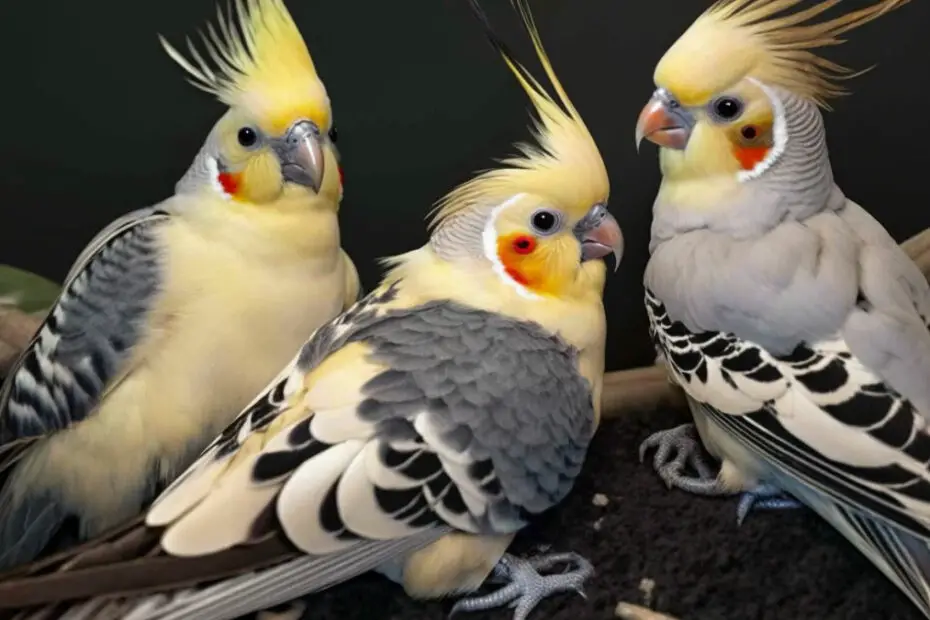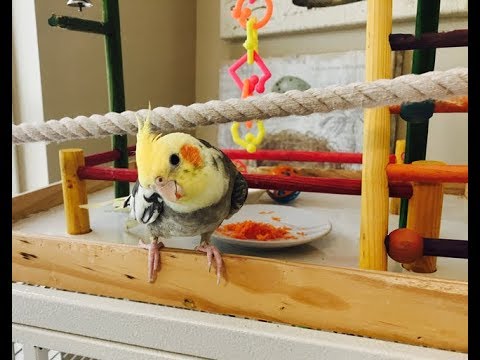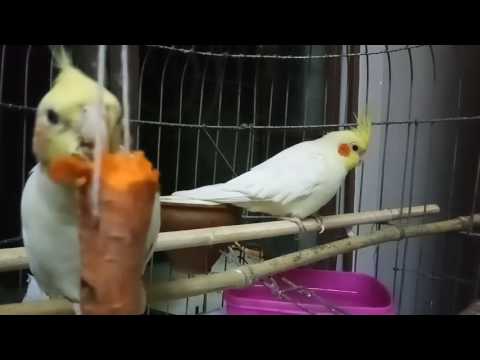Cockatiels are native birds of Australia and pets worldwide. But having birds as pets comes with its fair share of planning. From it’s eating to sleeping, everything needs careful execution.
Now the question remains, Can cockatiels eat carrots? Yes, they eat carrots, and carrots are a fantastic diet item when you plan to keep a cockatiel as your pet. Carrots contain various kinds of vitamins and minerals, which are nutritious for your pet cockatiel.
So, how should one go about feeding carrots to their cockatiels, and how much every day is the right amount. Read up to find out about the various nuances.
Can Cockatiels Eat Carrots?
They sure can. Cockatiels enjoy both the green part and the long fleshy part of a carrot. You can provide your pet with either organic carrots or store-bought, and both can be a good item in their diet. You can offer your cockatiels bite-sized crunchy raw carrots, and they can quickly eat crunchy carrots using their beaks.
Among several benefits of having many types of vitamins and minerals in this orange fleshy root, the high sugar content of carrots is one disadvantage. Thus consuming too many of them can pose an issue. These sweet little root vegetables are delightful but high in natural sugars. While this is fine in moderation, overeating can contribute to health problems like obesity.
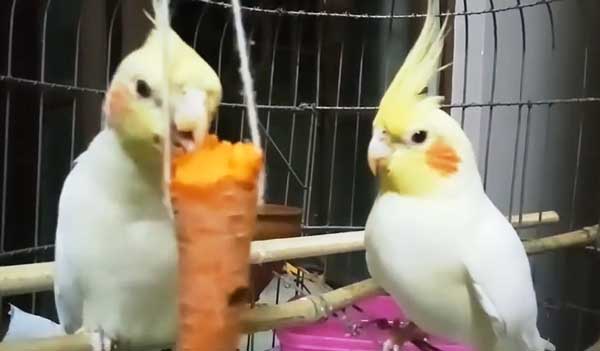
Take a look at the nutrients that a 100 grams of Carrot have from Healthline:
- 41-kilo calories
- 88 percent water, 0.9-gram protein
- Carbohydrate content: 9.6 g
- Sugar content: 4.7 g
- 2.8 grams fiber
- 0.2 grams of fat
Cockatiels require a well-balanced diet that consists primarily of seed and bird pellets. It would also be beneficial if you always complement their diet with fresh fruits and vegetables.
Because different food items and vitamin variations are required, you should be sure to moderate the carrot content in their daily diet. It would be okay for them to have a few carrot bits daily, but ensure they only get approximately 10% carrot in their total diet.
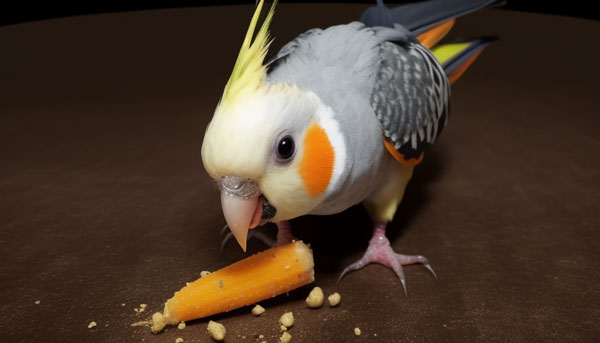
Delicious vegetables other than carrots, such as beet greens, broccoli, corn, sprouts, kale, spinach, pumpkin, sweet potatoes, mustard greens, turnip greens, and dried tomatoes, are on the list of these birds’ preferences. While most veggies are best served uncooked, cockatiels like roasted pumpkin and sweet potatoes. Of course, spices should always be avoided.
Do Cockatiels Like Carrots?
Cockatiels are crazy for carrots! A cockatiel’s diet must include fresh vegetables, and carrots are an excellent choice. They will enjoy carrots since they prefer crunchier foods. However, moderation is still essential; feed them in modest amounts and switch them out for other snacks.
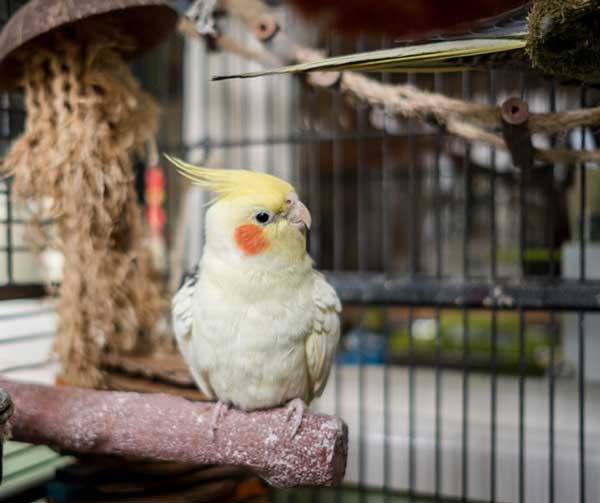
Health Benefits For Cockatiels Eating Carrots
Carrots are suitable for your cockatiel’s health in various ways. Carrots contain high amounts of minerals such as vitamin K, calcium, vitamin A, and beta carotene. They help nourish your cockatiel’s body, promoting good health and strong bones.
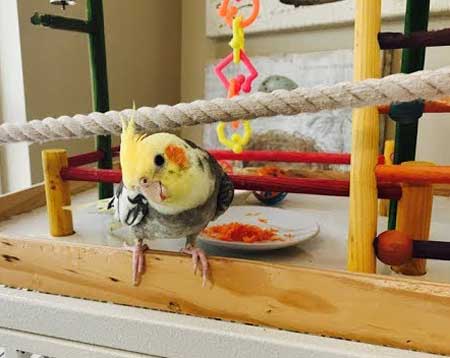
Carrots also promote good eye health and lower the chance of cancer in your cockatiel friend. Carrots’ high fiber content also aids with the regulation of your cockatiel’s digestive system, ensuring that everything runs smoothly.
How much Carrot should Cockatiels eat?
Every day, an adult cockatiel will take 1.5 to 2 level Tablespoons (30 – 40 grams) of seed or pellets. You can include 10% carrots in the 30-40 grams of meals you serve. Some owners like to feed their Cockatiels for lunch, which is OK as long as the daily total is not exceeded. In the wild, cockatiels eat in the morning and early evening.
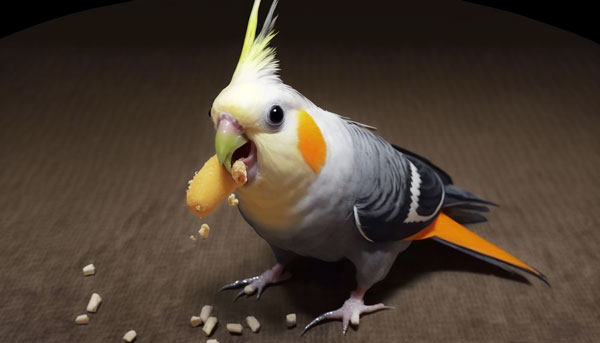
How do you prepare Carrots for Cockatiels?
There are three significant ways to prepare the carrots to feed your cockatiel. All three of them are explained below.
- Chunks – After properly washing the carrots, cut them into smaller pieces to make it easier for your bird to eat. Chunks can work as long as they can comfortably fit the disc shapes in their tiny claws.
- Finely minced – Finely mince the Carrot to generate bite-size bits that your cockatiel can readily pluck from their meal bowl. Mincing the vegetable makes it simple to combine it with other healthful snacks for a tasty combination.
- Puree – While puréed vegetables may appear easier for your cockatiel to eat, this is not always the case. Baby food can be sticky and difficult for them to swallow. Furthermore, it might enter the nostrils and produce obstructions.
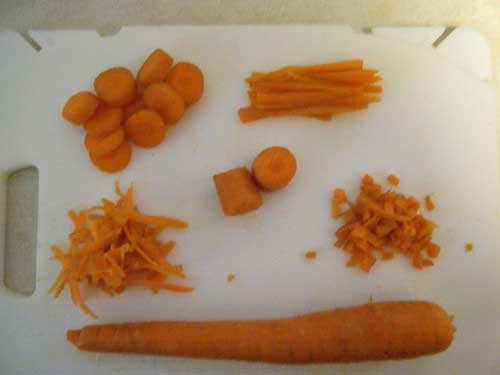
The best way to give your cockatiel the carrots is by finely mincing them. They won’t be as big as chunks and not too small or liquid as puree, and they will be able to relish the carrots easily.
Can you feed Carrots to baby Cockatiels? If so, how?
If you want your bird to eat its veggies, you’re going to have to get creative. Try using a knife to make thin slices or interesting shapes. You could even try giving it some “projections” to make it more fun for the birdie. Who knows, maybe your bird will actually enjoy its veggies this way!
Feeding cockatiel chicks can be risky if you don’t know how to proceed. Fear not; with a syringe and puree of carrots, you can start feeding baby cockatiels harmlessly.
Hold your cockatiel softly in one hand and a syringe filled with carrot puree in the other. Try to open the bird’s beak and insert the syringe from one side of its mouth. After it opens its beak, fill its mouth with a drop of the puree.
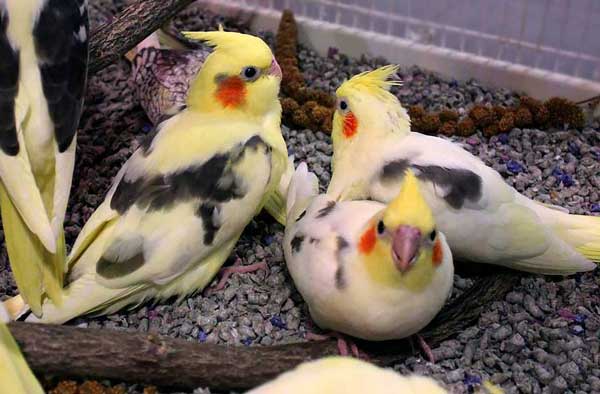
Repeat this process slowly and without haste to avoid harming your cockatiel. In this way, you can easily feed your baby cockatiels carrots or other veggies that are crunchy, like carrots. There is also other food you can use to feed your pet bird and check them out from the link.
Video Of Cockatiels Eating Carrot
Enjoy the video of cockatiels enjoying their food.
FAQ
Your curiosity may not be satiated yet. So here are some common questions that one might have, which we answer for your sake.
Cockatiels may eat veggies that are fresh, prepared, or thawed from frozen. Before feeding, wash all fresh veggies and cut them into little pieces. Avoid using salt or spices when cooking veggies for your cockatiel.
There are several other veggies that they can eat, are asparagus, Leaf lettuce, cabbage, cauliflower, kale, watercress, and sweet potato.
Cockatiels will consume eggs as part of a high-protein diet. You may need to try several preparation methods to determine how your bird prefers his eggs: hard-boiled, scrambled, soft-boiled, fried, or boiling. Your cockatiel will most likely not eat the entire egg but will eat till satisfied.
Conclusion
Carrots are healthy for your cockatiel pet, either cooked or raw. But it’s better raw as they like crunchy food more. So you can add carrots to their diet with other feeds as well.
But it is essential to maintain moderation as overeating one food will lose out on other vitamins and minerals. Thus moderation is vital.
Do you know if your cockatiels can eat parakeet food or kiwi? Read our articles about it to learn more.
